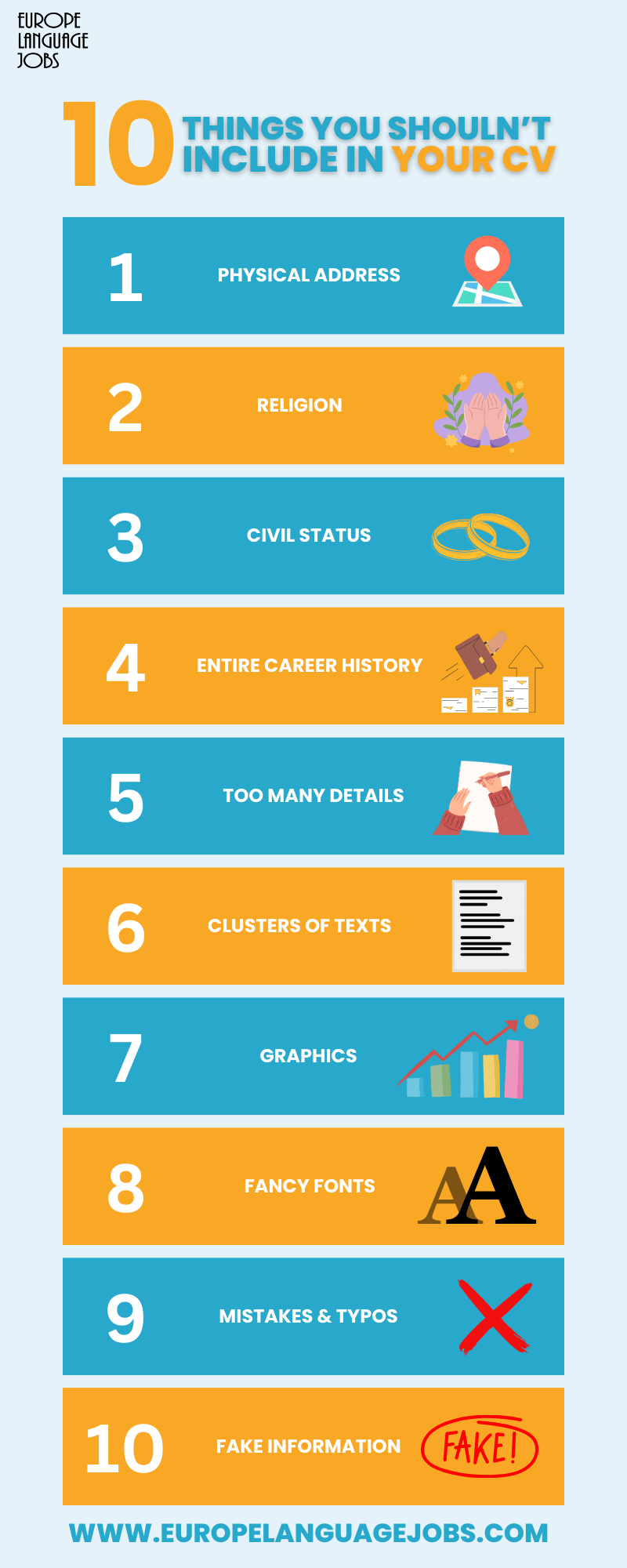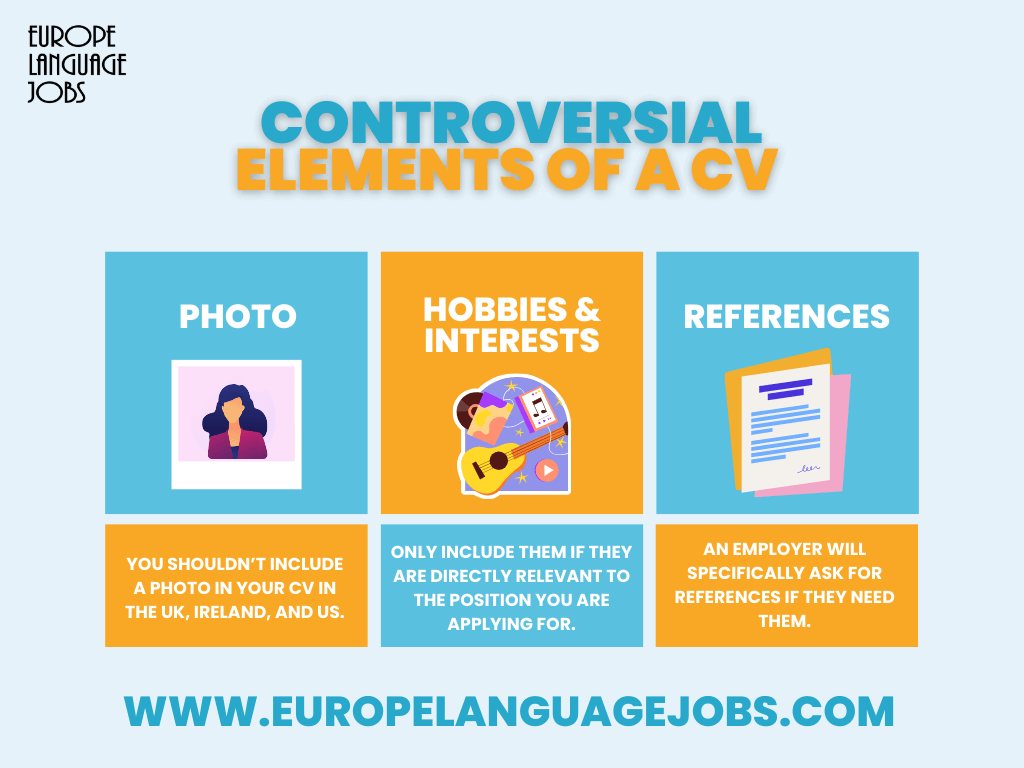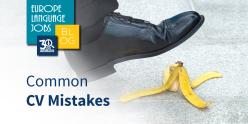Did you know that recruiters may not be able to hire you if you include certain details in your resume?
Yes, there is information they don’t want to see because it’s irrelevant or inappropriate, and they will be forced to put your resume in the “discarded” pile - no matter how great your candidate profile is.
We spend so much time wondering what to include in a resume, that many of us fail to turn the question around: Which information is unnecessary in a CV?
The urge to contain every little detail about us is strong, but remember one thing: a CV has to be concise. A recruiter only spends an average of 6 seconds scanning a resume, so the longer it is, the less likely it will catch their attention.
The ideal length of a CV is one page - a maximum of two pages for professionals with many years of experience. But even they should aim to keep their resume on one page only to increase their chances of being invited for an interview.
Therefore, you need to choose smartly which pieces of information you decide to include to keep your CV short.
So, what can you cut out to make space for the important bits? Which details to avoid? What kind of information will get your CV discarded?
At Europe Language Jobs, we see many CVs - and many mistakes job seekers make. We decided to create a guide including all the things you shouldn’t include in your resume and answer all the above questions.
What should not be included in a CV?

There are two cases: things you should never include in your CV, and things that depend on the situation. We will start with the details you should never put on a CV:
- Physical address
- Religion
- Civil status
- Your entire career history
- Too many details
- Clusters of text
- Graphics
- Fancy fonts
- Mistakes and typos
- Fake information

1. Physical address
Many job seekers still include their physical addresses in resumes - street, house number, and postal code. This is a residue of times when communication used to be carried out primarily through traditional post. But we can all agree that those times are long gone by now.
Including your physical address in a CV is unnecessary. Your email address, phone number, and a link to your LinkedIn profile are enough. Make sure all three are updated and you check them regularly!
If you wish, you can include only your country of residence, so that the recruiter would know where you are based. However, this isn’t necessary, and the person reviewing your CV can easily check that in your LinkedIn profile.
Your physical address isn’t useful at all during the recruitment process. Your employer won’t ask for it until you’re signing your contract once you get hired.

2. Religion
We sometimes see candidates specifying their religion in their resumes. In fact, this is one of the details that might get your CV discarded.
Employers aren’t allowed to ask about your religion. They are trained to avoid any information about your beliefs, political views, or sexual orientation, so if you willingly include it, they might decide it is safer to not proceed with your application.
The recruitment process is supposed to be fair and free of any kind of bias. Knowing any kind of information that might lead to suspected bias towards a candidate might land a recruiter in trouble. Therefore, they prefer not to choose CVs which include those details.
Even if religion is an important part of your life and who you are, you shouldn’t include it in your resume.

3. Civil status
At Europe Language Jobs, we have seen our fair share of CVs stating the candidates’ relationship status.
Interestingly, it is mostly women who decide to indicate whether they are single or married in their resumes. Some even insert the number of children next to their relationship status.
You absolutely can’t include this kind of information in your CV, or any documents in the professional world.
An employer should never ask about your civil status, number of children, or even plans regarding having children in the future during the recruitment process or after you’re hired.
Of course, it’s okay to talk about it off-the-chart in everyday, friendly conversations. You can ask or be asked about it as a colleague, but not as an employee. Those kinds of topics mustn’t be touched upon in a professional context.
Again, it’s all about laws regarding bias. Deciding not to hire or fire someone on the grounds of them possibly taking parental leave or asking for time off to care for a family member is a serious allegation.
Employers prefer to stay clear of such accusations by not obtaining this kind of information about their employees, so you shouldn’t voluntarily provide it, either.

4. Your entire career history
An average person has around 12 jobs during their life. Imagine trying to fit all of this on one A4 page.
Fresh graduates and young professionals can still list all of their professional experience. But once you collect more experience and the positions and companies start to pile up, you will need to start choosing the most relevant options.
Always aim to include between 3 and 4 most crucial past experiences in your resume. They can be the most recent ones, or the most relevant for the position you are applying for.
It is better to list fewer positions and provide details regarding your daily responsibilities and achievements than simply state past titles and company names without including any sort of information about your tasks and accomplishments.

5. Too many details
While you should provide the most crucial details about your past positions, we also advise you to find a balance between enough and too much. Outline your main responsibilities at every job and include specific examples of achievements - qualitative or quantitative.
Here is an example of a good description:
Sales Representative
-
Performed research to acquire new leads and made cold calls introducing our product to potential customers
-
Constantly analysed performance to spot opportunities for improvement in generating leads and increasing conversions
-
Regularly met monthly goals and increased the conversion rate by 3%
The bullet points concisely explain daily tasks and give a numerical example of an accomplishment. At the same time, they don’t go into too much detail. They are just enough for a recruiter to be able to tell whether the candidate’s experience matches what they are looking for.
If they need more details, they will ask for them during the job interview. The job of a CV is to state the most important facts and catch the recruiter’s attention - not provide all the information. You can write more in your LinkedIn profile, as recruiters will likely review it, anyway.

6. Clusters of text
Recruiters go through dozens, or sometimes even hundreds, of CVs every day. Your resume needs to catch their attention and hold it among the sea of other CVs.
A wall of text never catches anyone’s attention. If anything, it has the exact opposite effect and repels the reader.
Just think about any leaflet you ever got or textbook you ever read without pictures and with large chunks of text. You probably threw out the leaflet and fell asleep over the textbook on multiple occasions.
This is why bullet points are your best friends when writing a CV. In the previous point, you can find an example of describing a past position using clear and concise bullet points.
Don’t try to squeeze too much content onto the page - it is tempting given there is never enough space, but a clattered resume doesn’t look inviting. Leave a lot of white space to make your CV friendly for a recruiter’s tired eyes.

7. Graphics
Using graphics in a CV to catch the recruiter’s attention is a good idea - but only in theory.
In practice, there is this thing called ATS (Applicant Tracking System), which ruins good intentions.
In short, ATS are software with multiple purposes - one of them is scanning large numbers of CVs to pre-screen candidates before their resumes find their way into recruiters’ hands.
They are programmed to search for keywords. Only CVs with a sufficient number of keywords targeted by the employer will make it to the next stage.
ATS are widely used in international recruitment - especially in big companies. They are constantly improving, but they aren’t nearly advanced enough to be able to decipher graphics just yet.
If something is represented in the form of a graph or picture, it doesn’t exist for an ATS. The software can only read text, which means that by including graphics, you lose out on a lot of keywords and your chances of advancing in the recruitment process drop.
In an ideal world, using graphics in a CV would be a great way to stand out. In the real world; however, recruiters are overworked and overstimulated, and their workflow is largely automated. This means that graphics are one of the things you should not include in a CV.

8. Fancy fonts
This point is somehow a continuation of the previous one. It could be tempting to use a fancy font to stand out from other candidates spelling their experience out in Arial and Times New Roman.
However, fancy fonts are actually unfriendly for both machines and humans.
Some ATSs can only process standard fonts. Using fancy fonts or symbols can result in a series of question marks (or other punctuation marks) instead of text.
But recruiters aren’t big on fancy fonts, either. They scan dozens of CVs, one right after the other. All they want is to see clear sections and information that is easy to find.
There is a reason Times New Roman and Arial are favoured in the business world: they are easy to read. They are so common, that our eyes are used to them and skim through them without an issue.
Fonts full of swirls or other embellishments make it challenging to focus. And a resume that is difficult to read automatically lands in the “discarded” pile.

9. Mistakes and typos
Typos or grammar mistakes are a big turn-off for recruiters. They don’t expect you to wax poetry, but they do require a thorough spell-check.
Including typos or errors in your CV suggests carelessness - never a quality any recruiter looks for in a candidate, regardless of the position.
If a recruiter receives a resume that looks carelessly put together, they might assume that you approach work in the same way and wouldn’t pay enough attention to your responsibilities.
Always use a spell-checker such as Grammarly or a resume-checker such as CV Maker. You can also go a step further and give your CV to a friend or family member to review. They can offer valuable insights and spot errors you wouldn’t because they haven’t already read it a hundred times.

10. Fake information
At Europe Language Jobs, we once received a CV from a candidate claiming to speak a language that doesn’t exist. Another one claimed to be a trainer of a sport that was also made up.
We’re not sure why they decided to put this sort of information on their resumes, but please don’t follow in their footsteps. Recruiters are proficient Google users and can draw their own conclusions when 0 searches come up.
This also refers to inserting information regarding languages or activities that exist but you never did them. Just don’t lie on your resume in general.
Recruiters have ways of verifying whether what you included in your CV is true, and they will do so. It is very hard to pretend you speak a language you don’t and very easy to verify your level in a certain skill, so you’re not doing yourself any favours making things up.

In some situations, including certain information in a CV can depend on the circumstances. For example on the country, the employer’s preferences, or your own judgement. Including the following details depends on several factors:

1. Photo
The issue of including a photo in a CV is controversial and depends on the country. Generally, it is okay in the majority of Europe. Job seekers looking for a professional presentation can create a perfect professional image using an AI CV headshot generator for countries where photos are acceptable.
You shouldn’t put a photo in your resume in the UK, Ireland, and the US.
This has to do with bias again. Some countries have very strict regulations regarding equality and fairness in the professional world.
In those countries, it is believed that including a photo in your CV may lead to speculations of someone being or not being hired based on their physical appearance.
Of course, the recruiter will still see you in the interview or the LinkedIn profile, but it is still better to avoid adding a photo if that is the local rule of thumb.

2. Hobbies and interests
Another controversial topic. The opinions vary between recruiters, but here at Europe Language Jobs, we always advise this:
Only include your hobbies and interests if they are directly relevant to the position you are applying for, and if you can back them up by specific skills.
For example, graphic design and video edition are very useful hobbies for an applicant for a Social Media Manager position. Or it makes perfect sense for someone with an interest in motorisation to apply for a Customer Service position at Audi.
Hobbies and interests also have the additional bonus of making you sound more human. Some recruiters might appreciate seeing a bit of a personal background behind the sheet of paper - others prefer seeing only details related to your career.
The perfect solution to find a balance between appeasing both approaches is to connect your interests to your career path.
If you are pressed for space and have more important information to include in the other sections, such as skills or work experience, skip the hobbies and focus on what you believe has more impact.

3. References
Many candidates wonder whether they should include references from previous employers in their application. Usually, if a company requires them, they will state it in the job description, or communicate it to the candidate directly.
In any case, references wouldn’t be included in the CV. They should be attached to it, just like a cover letter (if there is one).
We advise to not attach references until the recruiter specifically asks you for them, or the job advert says you must attach them to your application.
These are the details that should not be included in a CV. Avoid any personal information such as your physical address, religion, or civil status, refrain from using graphics and fancy fonts, and design your resume in an eye-catching way, without walls of text or unnecessary details.
Information such as a photo, interests and hobbies, and references largely depend on the country and the employer’s preferences. Always do your research about the company you are applying for before sending your application, or ask the recruiter during the recruitment process.
Were you surprised by any of the things you shouldn’t put on a CV? Do you think there is anything else that should be left off a resume? Share your thoughts in the comments below!
Feeling inspired? Visit our blog for more career advice! How can you be sure the information we provide is top-notch? We are a group of professionals working with recruiters, career coaches, and HR specialists from all over the world!
Trust our experience and let us help you find a new job in Europe!















Rita 1y ago
This is insightful. But I have added my resume already though, I hope that's not going to cause any problem
This is insightful. But I have added my resume already though, I hope that's not going to cause any problem